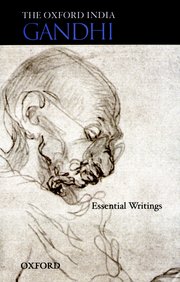“Nobody progresses without opposition. New Delhi : 1-9–1946″ – Mahatma Gandhi
Gandhi Smriti and Darshan Samiti (GSDS) was formed in September 1984 by the merger of Gandhi Darshan at Rajghat and Gandhi Smriti, at 5, Tees January Marg as an autonomous body, and is functioning under the constructive advice and financial support from the Ministry of Culture, Government of India. The Prime Minister of India is its Chairperson and it has a nominated body of senior Gandhians and representatives of various government departments to guide it in its activities. The basic aim and objective of the Samiti is to propagate the life, mission and thought of Mahatma Gandhi through various socio-educational and cultural programmes….
It has two campuses:
(a) Gandhi Smriti
Gandhi Smriti, housed in the Old Birla House on 5, Tees January Marg, New Delhi, is the sacred place where Mahatma Gandhi’s epic Life ended on 30 January 1948. […]
(b) International Centre of Gandhian Studies and Research
The second campus is situated adjacent to the Mahatma Gandhi Samadhi at Rajghat. The sprawling thirty-six acre campus came into existence in 1969 to mark the centenary of Mahatma Gandhi. An International Gandhi Darshan Exhibition was housed to commemorate the occasion. Divided into six huge pavilions spread across the campus, it sought to bring alive the eternal message of the Mahatma “My Life is My Message”. The founding fathers envisaged that in due course of time it would evolve into an educational centre of international stature. […]This dream came true when in 1994, during the 125th Birth Anniversary of Gandhiji; the campus was converted into an International Centre of Gandhian Studies and Research (ICGSR). The Centre offers research and guidance facilities to scholars from India and abroad, documentation of various peace initiatives and seeks to provide various inputs on Gandhi and allied subjects at one place. At present the Centre provides a comprehensive exhibition on Gandhi, conference halls, camping facilities for major national and international meets, a library, children’s corner, photo unit and a publications division.
Source: Gandhi Smriti and Darshan Samiti
Address : http://www.gandhismriti.gov.in/indexb.asp
Date Visited: Wed Nov 23 2011 19:07:00 GMT+0100 (CET)

Library copies: Worldcat.org >>
Gandhian social movement >>
“Air is free to all but if it is polluted it harms our health… Next comes water… From now on we must take up the effort to secure water. Councillors are servants of the people and we have a right to question them.” – Mohandas K. Gandhi, Ahmedabad address on 1 January 1918; quoted by his grandson, Gopalkrishna Gandhi, in On another New Year’s Day: Mahatma Gandhi’s ‘khorak’ a 100 years ago | Learn more >>
“The slogan today is no longer merely ‘Asia for the Asians’ or ‘Africa for the Africans’ but the unity of all the oppressed races of the earth.” – Mahatma Gandhi addressing two stalwarts of the struggle struggle in South Africa against apartheid), quoted by Vinay Lal in The Solidarity of Oppressed Peoples: A Tribute to E S Reddy, Anti-Apartheid Activist >>
Any attempt to paint the past as glorious should make us wary. It is generally done to divert attention from a not-so-glorious present. And, sadly, for most people, the glorious past has been distilled into a mélange of cows, yoga and spurious herbal remedies. Right now we are in the midst of a name-changing game, as if by changing a name, history can be erased. Battles lost have become battles won, words on plaques have been changed, the victor becoming the loser, the loser the victor. You can change names, but you can’t change the truth of history, slithery though it is. Though, today, the question that confronts us is: where is the truth of history? Or is there no such thing, and will we continue to have different versions depending on who is in power?
Source: “Why have we lost the spirit of questioning handed down by the Vedas, the Upanishads, the epics?” by novelist Shashi Deshpande in “Why have we lost the spirit of questioning handed down by the Vedas, the Upanishads, the epics?” (Scroll.in, 25 July 2021)
URL: https://scroll.in/article/1001004/why-have-we-lost-the-spirit-of-questioning-handed-down-by-the-vedas-the-upanishads-the-epics
Date Visited: 25 July 2021
[Bold typeface added above for emphasis]
Mahatma Gandhi interested in promoting the Adivasi culture – Adivasi Sanskriti Sangam in New Delhi >>
Government of India, national & international organizations
Endangered languages: Peoples’ Linguistic Survey of India
Govt. of India, NGOs, Indian universities and international organisations
Govt. What are the Rights of Scheduled Tribes (ST)
Human Rights Commission (posts) | www.nhrc.nic.in (Government of India)
India’s Constitutional obligation to respect their cultural traditions
India’s 28 States and 8 Union Territories
National Commission for Scheduled Tribes | Related posts
Particularly Vulnerable Tribal Groups (PVTG)
People’s Linguistic Survey of India | Volumes (PLSI) | PeoplesLinguisticSurvey.org
Universal Declaration of Human Rights & International Convention against Torture
Women | Safe search | President Droupadi Murmu on women’s empowerment
Legal provisions
Child rights & Right to education handbook
Constitution and Supreme Court
Denotified, nomadic and semi-nomadic (“hidden”) tribes: Classifications in different states
Forest Rights Act (FRA) | Legal rights | What is the Forest Rights Act about?
India’s Constitutional obligation to respect their cultural traditions
Scheduled Tribes (ST) | Who are Scheduled Tribes?
Who is a forest dweller under this law, and who gets rights?
Resources
Anthropology & Anthropological Survey of India
Books on tribal culture and related resources
Fact checking | Factchecker.in | Safe search examples with keywords:
“factchecker.in rural india“| “factchecker.in adivasi tribe“
Figures, census and other statistics | Primitive Tribes in Andaman and Nicobar Islands (Census 2011)
Indian magazines and web portals – news coverage and analysis
Indigenous knowledge: biodiversity, ecology, health, nutrition, nature, wildlife
Languages and linguistic heritage
Nehru’s 5 Principles: Panchsheel
News update in Indian periodicals: Tribal Affairs
People’s Linguistic Survey of India | Volumes (PLSI) | PeoplesLinguisticSurvey.org